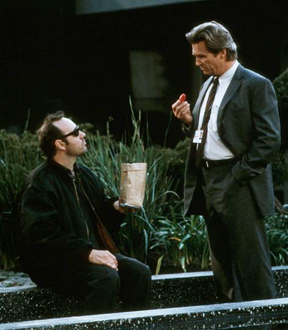Serenity Now
Despite Spacey's Schizo Alien, 'K-PAX' Settles for A Mellow Message
By Patrick Reed

"Take me to your produce section!"
The trailers for K-PAX are somewhat misleading. Watching Kevin Spacey eat a banana, skin and all, and gruffly bark to dogs as kids watch nearby in awe, gives the impression that this pseudo-sci-fi movie will be full of cloying, preachy sentiment, the sort of megastar "feel-good" picture that Robin Williams and John Travolta have made far too often in past years - in other words, a film that is DOA in terms of original, challenging ideas and dramatic force. This effort, which pits perhaps our most highly regarded celluloid thespian of the moment (Spacey) against one of the more underrated and consistent actors of the past quarter-century (Jeff Bridges), strives for safe and familiar messages about human life here on Earth - living in a loving family is the most exalted of states, life is too short to hold grudges, each of us is a special person, and so on - but its sermonizing isn't overbearing, and K-PAX's ambitious premise, adapted from the 1995 novel by Gene Brewer, seems promising at first.
K-PAX opens in Grand Central Station, where a middle-aged man (Spacey) appears out of nowhere in the midst of the bustling crowd. Almost glowing with serenity, the sunglasses-wearing stranger soon ends up at Manhattan's psychiatric hospital, and in his initial session with Dr. Mark Powell (Bridges) explains that he is an interplanetary explorer named Prot, from a planet called "capital K, dash, capital P, A, X." Powell, whose office and demeanor exude the comfortable confidence of long-term professional success, is mystified by this newcomer, who devours fruit like a baboon and rattles off witty, logical justifications for his extraterrestrial existence. Powell quickly becomes obsessed with finding the chinks in Prot's persona, while many of the jittery ward patients (which include Songcatcher's David Patrick Kelly and Peter Gerety, from TV's Homicide: Life On The Street) turn to Prot for advice and leadership.
Much of the film's portrayal of the mentally ill is nothing special - draping a TV-movie-quality sheen on previous depictions ranging from One Flew Over the Cuckoo's Nest (1975) and Awakenings (1990) to Twelve Monkeys (1995) and too often settling for easy laughs - and director Iain Softley, best known for the lively Beatles-in-Hamburg biopic Backbeat (1993), cuts too many scenes short just as things start to become interesting. Overall, the film's plotting is slackly paced, especially early, when Softley over-envelops Prot in an aura of lucid mystique. Still, Prot's description of life on K-PAX is captivating; he speaks of a life without a family on the distant sphere, of a society that doesn't need the ties that bind, and it seems like a clue to the doctor about Prot's earthly background - but Powell gets nowhere. When one of Powell's friends, a leading astronomer, validates Prot's MIT-worthy calculations about a far-away galaxy that he claims as his homeland, the normally-assured psychiatrist finds himself doubting his own expertise more than ever before.
K-PAX plainly wants the audience to wonder, along with Powell, whether a) Prot truly is a benevolent ethereal sage, bent on setting the barely-evolved human race on the right track, or b) he is an extremely troubled multiple-personality case study trying to escape a traumatic past history. A concurrent subplot involving Powell's lack of family life - he has severed relations with his college-age son from a first marriage and neglects his younger, second wife (Mary McCormack) and three kids - is rather predictably held up to gentle rebuke by both Prot and director Softley. On the other hand, as Powell finally begins to unravel Prot's psyche through hypnosis sessions and amateur detective work, the accumulating evidence begins to indicate that this ostensibly autonomous alien loner may as well have all-too-human - and far more tragic - family issues torturing his soul.
The final quarter of K-PAX attempts to logically explain Prot's condition, only to re-introduce doubt about his otherworldly origin in an ambiguous finale. Softley aims to uplift spirits near the end, acknowledging mankind's cruel imperfections but offering an inkling of hope for the future as Powell realizes the value of life's simple verities. Overall, K-PAX is a respectable aggregation of several of American cinema's most hardy and predictable themes, but lacking in excitement. Acting-wise, Kevin Spacey has the obvious showy role, but Prot is no match for Verbal Kent/Keyser Soze (1995's The Usual Suspects) and Spacey's other peak achievements - American Beauty (1999) and especially L.A. Confidential (1998). Conversely, as Dr. Powell loses his professional and personal bearings he becomes a more interesting character as the film proceeds, in several ways reminiscent of two other fine Jeff Bridges performances - the disillusioned disc jockey in The Fisher King (1990) and the reinvigorated air-disaster survivor in Fearless (1993).